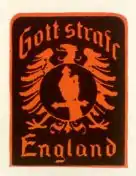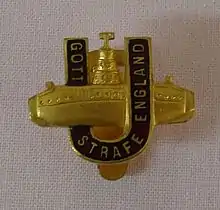Gott strafe England
"Gott strafe England" was a slogan used by the German Army during World War I. The phrase means "May God punish England". It was created by the German-Jewish poet Ernst Lissauer (1882–1937), who also wrote the poem Hassgesang gegen England (lit. "Hate song against England", better known as "Hymn of Hate").[1]

History

In the hysterical atmosphere brought on by World War I, Lissauer's Hassgesang became an instant success. Rupprecht of Bavaria, commander of the Sixth Army, ordered that copies be distributed among his troops. The Kaiser was pleased enough to confer upon the author the Order of the Red Eagle.[2] An informative account of Lissauer and the "Hymn of Hate" can be found in Stefan Zweig's The World of Yesterday.
Despite the general atmosphere of condemnation against England for "causing the war", the Hassgesang was not without its critics. The Frankfurter Zeitung was bold enough to denounce the "impotent hatred that spits at us everywhere". With one or two exceptions it was not widely popular among Lissauer's fellow Jews, who had a tendency to identify with England's liberal tradition. The publicist Benjamin Segel said that the poem did not contain "as much as a spark of Jewish sentiment." Lissauer's song and slogan proved to be similarly less popular within the wider German intelligentsia. The painter, photographer, and caricaturist Helmut Herzfeld went so far as to change his given name in protest to an English one and to anglicize his surname, henceforth to be known as John Heartfield.
Unofficial stamps with the motto were produced by organisations, such as the "Federation of the Germans in Lower Austria".[3] In at least 1916 browncoal bricks were embossed with the motto "Gott Strafe England" and sold in the Netherlands.
In England in 1916, the music hall singer, Tom Clare wrote a comic song "My Hymn of Hate" in a comic vein giving a list of people and phenomena that he hated. The list included, for example, journalists who criticized how the war was being run, but did not want to join the army themselves.
In 1946, in Hamburg, Germany, "Ausgebombte" (bombed out refugees) demonstrators sang the song.[4]
Other uses

English poet J. C. Squire uses the phrase in his poem "God Heard the Embattled Nations":
God heard the embattled nations sing and shout
"Gott strafe England" and "God save the King!"
God this, God that, and God the other thing –
"Good God!" said God, "I've got my work cut out!"[5]
George Bellows created a lithograph titled "Gott Strafe".[6] Louis Raemaekers created a cartoon titled "Gott strafe England".[7]
The phrase gave rise to the term "Strafing" and to the nickname "Strafer" that was given to the British General William Gott in World War II.
References
- "Hassgesang gegen England — Hymn of Hate, by Ernst Lissauer". Hschamberlain.net. 1914-10-15. Archived from the original on 2013-05-29. Retrieved 2013-07-12.
- Millington, Richard; Smith, Roger (15 June 2017). ""A Few Bars of the Hymn of Hate": The Reception of Ernst Lissauer's "Haßgesang gegen England" in German and English". Studies in 20th & 21st Century Literature. 41 (2). doi:10.4148/2334-4415.1928. Retrieved 3 September 2018.
- "Gott Strafe England Cinderella Stamp | Australian War Memorial". Cas.awm.gov.au. Archived from the original on 2012-09-10. Retrieved 2013-07-12.
- "Foreign News: Gott Strafe England", Time, July 08, 1946
- "Archived copy". Archived from the original on 2012-03-08. Retrieved 2010-08-03.CS1 maint: archived copy as title (link)
- "Gott Strafe (Gott Strafe England) by George Bellows / American Art". Americanart.si.edu. Retrieved 2013-07-12.
- Raemaekers' Cartoons, BiblioBazaar, LLC, 2009, ISBN 978-0-559-12667-3